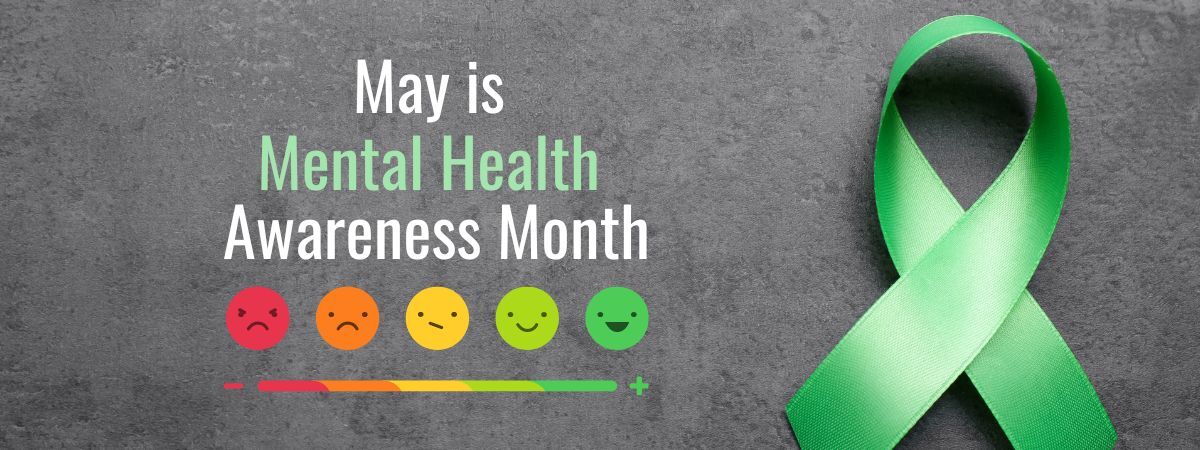
Mental Health Awareness Month At The Counseling Center
May 2023 marks Mental Health Awareness Month, an annual observance dedicated to raising awareness about mental health, reducing stigma, and promoting access to care and resources in the United States.
This has been recognized across the country since 1949 and has become increasingly important over the last few years, particularly in the wake of the COVID-19 pandemic and its impact on mental health.
According to the National Alliance on Mental Illness (NAMI), 1 in 5 adults in the US experience mental illness each year. However, despite the prevalence of mental health challenges, stigma, and lack of access to care often prevent individuals from seeking help.
"These numbers seem disturbing, but accurate," says Scott Busby, head of admissions for The Counseling Center.
“It’s important to remember that mental health is just as important as physical health, and by prioritizing mental health, we can improve overall health outcomes for individuals and communities such as the four states in which The Counseling Center offers outpatient programs.”
This year's Mental Health Awareness Month theme, "Hope for Change," emphasizes the importance of hope in recovery and the power of individuals and communities to make a difference.
By increasing awareness, reducing stigma, and promoting access to care, The Counseling Center is one of the leading outpatient programs dedicated to creating a more supportive and inclusive environment for those struggling with mental health challenges.
Treatment Centers Can Help Make Addiction Services More Accessible
If you don’t require persistent inpatient support but would still benefit from a set schedule of treatment to maintain sobriety, IOP (Intensive Outpatient) is a natural step to take.
The skilled professionals at programs like The Counseling Center help you manage mental and physical health and build vital life skills without distracting you from your normal activities. You can fit behavioral and mental health therapy into your busy lives at over a dozen convenient locations.
You have the chance to tackle your primary mental health challenges at their very roots in Outpatient Programs and personal therapy meetings at The Counseling Center.
The Mental Health Outpatient Programs at The Counseling Center cover a wide scope of therapies in non-residential programs involving three group therapy sessions per week and an individualized timetable for individual and family therapy.
Individual Therapy
As the nation continues to grapple with this ongoing crisis, primary mental health centers are mobilizing to call for urgent action to ensure that such treatment is accessible to everyone who needs it.
Mental health and substance use disorders usually come with co-existing mental health disorders or trauma.
Your expert therapist will appraise your own personal situation to determine how to design your therapy. Our counselors utilize a range of therapy techniques to treat substance use and mental health, including:
-
Cognitive Behavioral Therapy
-
Dialectical Behavioral Therapy
-
Trauma-informed Therapy
-
Motivational Interviewing
During your therapy, you work one-on-one with a credentialed therapist where you can discuss your thoughts and feelings concerning mental health and perhaps substance use in private and without fear of being judged. Sessions are offered during the day and evening so you may still address your other daily family and work commitments.
On a weekly basis in IOP, you’ll attend three group therapy sessions and a single personal therapy session. These sessions give you the help you need to abstain from substance use while engaging in your daily obligations.
You will explore substance use, address your mental health, and then return home to your customary day-to-day life. Medication management could also be a part of your customized IOP strategy at The Counseling Center.
Despite the challenges regarding mental health treatment, there's hope. As Busby points out, the importance of access cannot be overstated.
“Mental Health Awareness Month is an important reminder of the importance of mental health and the need to prioritize it in our personal and collective efforts to build healthier, happier communities," continued Mr. Busby. "Only by working together can we hope to overcome this crisis and break the silence and stigma around mental illness, and Mental Health Awareness Month provides an opportunity for us to do just that.”
Overcoming behavioral disorders and addiction is more of a journey than a one-and-done process. That’s why The Counseling Center provides ongoing outpatient treatments that are personalized to your needs. Mental Health Awareness Month is a critical time to address these issues and promote mental health as an essential aspect of overall well-being.
Moreover, if you have finished inpatient rehab and want to build on what you achieved, these therapies aid in re-programming the way you think for better mental health and to manage substance use and other co-occurring disorders such as those that are a key focus of Mental Health Awareness Month:
-
Anxiety
-
Obsessive-compulsive Behaviors
-
PTSD
-
Bipolar Disorders
-
Personality Disorders
-
ADHD
-
Depression
Throughout the month of May, organizations and individuals across the country like The Counseling Center will be engaging in activities and events to raise awareness about mental health, promote self-care and resilience, and provide resources for those in need.
Individuals can also show their support by sharing their own mental health experiences, engaging in self-care activities, and advocating for mental health resources in their communities, as at the fourteen locations of:
The Counseling Center — Praesum Healthcare
For immediate help with your mental health needs, please call: 833-248-6271

